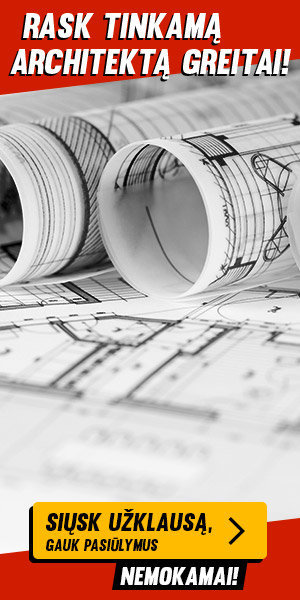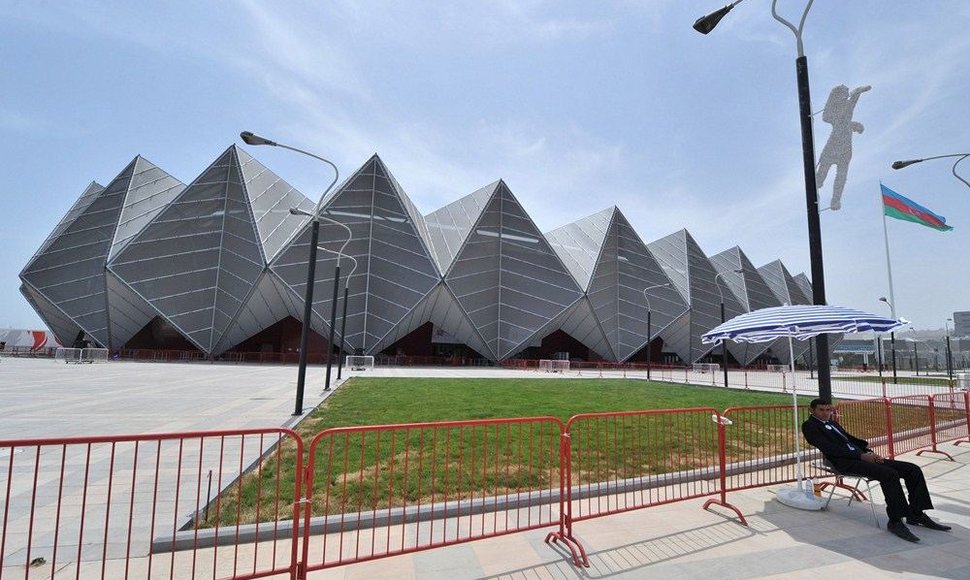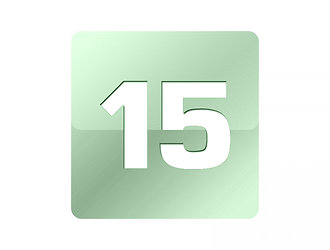Using the occasion of Baku hosting a major international event, hundreds of youths held a pro-democracy rally in the city centre on Wednesday. The demonstration was peaceful and orderly. Participants did not shout any slogans – they only wore T-shirt saying “Sing for Democracy.” The police, who usually bully such protesters, were uncharacteristically lenient this time.
“Hothead Caucasians” can find anything
Local people speak about democracy problems only anonymously and in vague hints. They are convinced that should they share their complaints about the regime – even if their words appear only in a Lithuanian paper – “hothead Caucasians” would find them anywhere.
Azerbaijan's breaches of basic human rights were reported this week on BBC programme “Eurovision's Dirty Secret.” It reveals the other side of Baku – demolished houses, persecuted people, oppressive regime run by President Ilham Aliyev, and supreme reign of his family.
According to local residents, only some of Baku's quarters look shiny and new, while most people have to live on a relatively modest 350-manat average monthly salary. For comparison, a ticket to Eurovision finals costs 300 manats.
This side of Eurovision, however, remains inaccessible to most foreigners who came to Baku. Architects and authorities of the “Wind City” have done their utmost to make even world-weary Western tourists gasp with wonder. The only bother is the local chaos – local people can hardly help them find their way around, they do not know street names, hardly anyone speaks English and most, even if they do know Russian, cannot explain anything.
New expensive face
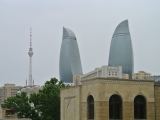 |
| Karinos Ziminaitės/15min.lt nuotr./Baku |
“When I came here five years ago, the entire Azerbaijan looked like a huge construction site – there were no roads, new buildings kept springing up, as well as hospitals, factories. No wonder, therefore, that the country has been topping economic growth rate tables for several years. What made this possible are the so-called “oil dollars” – money from extracting oil. This gave a boost to cultural development too, so Eurovision is just a point on a steady road,” one of Eurovision spectators, Lithuanian ambassador to Baku Kęstutis Kudzmanas, told 15min.
According to him, Azerbaijan has a rule that big money guarantees best quality – and money is something the country has plenty of. Kudzmanas notes that the progress is so fast that local mentality can hardly keep up with the changes.
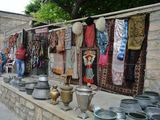 |
| Karinos Ziminaitės/15min.lt nuotr./Pasivaikščiojimas po Azerbaidžano sostinę Baku |
“People are still as open-hearted, friendly, hospitable as any other Caucasian nation,” he says. Waiting for Eurovision, Azerbaijanis have built luxurious hotels, restaurants, music halls, new streets. According to the ambassador, it shows that Azerbaijan has not been preparing only for the Eurovision Song Contest but for an entire new era of tourism.
Proud of their achievements
Kudzmanas explains the massive Eurovision euphoria by referring to the collective spirit characteristic of the Orient. “The country is very proud of its achievements – in sports, sciences, and other areas. Eurovision was a chance to show the world their modern face, as many imagine Azerbaijan as a post-Soviet country of ruins and oil towers. What people see here is the opposite,” he says.
He admits, however, that Baku's modernization was drastic at times and some people miss the old town and its narrow streets.
“Azerbaijan has invested billions in order to show what it looks like now. Until now, it was a terra incognita to Europeans. By the way, Azerbaijanis are very tolerant and polite. Azerbaijan has allowed everyone to come, even homosexuals,” the Lithuanian ambassador says.
Taxis, flowers, and gays
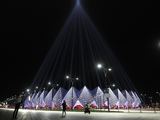 |
| AFP/„Scanpix“ nuotr./Crystal Hall |
The town purchased new eggplant-coloured taxi cars specifically for Eurovision. These are the only cabs in town with taximeters. On the night of the first semifinal, one driver shared that he and his colleagues could hardly meet the demand, even though the authorities ordered a hundred extra cars into the streets. According to drivers, about 1,100 official taxis roam the streets of Baku.
“We are happy that Eurovision is happening in Baku. We want to show our beautiful city, open up our country that we are so proud of. It's great that you come visit, because you will like it and come back,” said taxi driver Baxtiyar who took me from the airport. Dozens of people I met afterwards recited the same text with little variation.
With only days left to the Eurovision finals, construction workers were still finishing laying pavement tiles in some places. Flowers outside Crystal Hall stadium were planted on Wednesday.
Lithuanian ambassador tells me that Eurovision organizers have applied for a permit to hold a gay pride parade in Baku. Local people say they are devout Muslims, but the authorities granted the permission. However, after consulting diplomats, Eurovision organizers decided to give up the idea – for security reasons and unpredictable reactions from the society. Apparently, in Azerbaijan, some things can be prevented by granting permissions.
This year, one traditional but conspicuously absent element of Eurovision is cross-dressers. In previous years, both journalists and Eurovision fans would dress up in bright colours, wear elaborate glasses and hats. In Baku, one can see that everyone tries to tone down the extravagance, while homosexual guests constrain themselves in public.
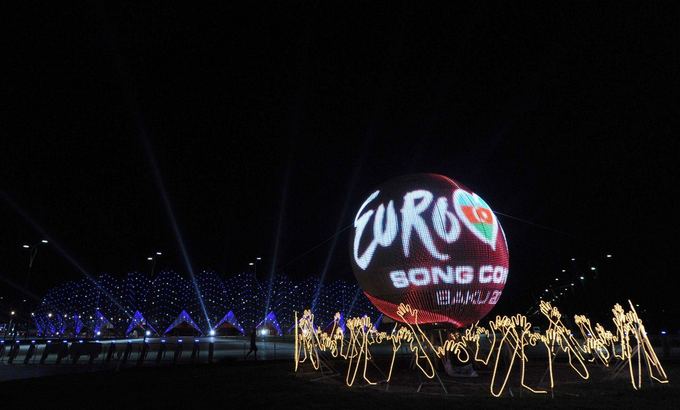 |
| AFP/„Scanpix“ nuotr./„Crystal“ arena |

